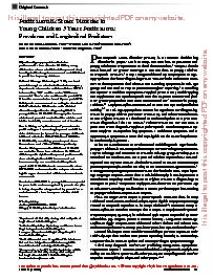Posttraumatic Stress Disorder in Young Children 3 Years Posttrauma : Prevalence and Longitudinal Predictors.
OBJECTIVE: Age-appropriate criteria for posttraumatic stress disorder (PTSD) in young children have been established. The present study investigated the long-term course of such PTSD and its predictors in young children. METHODS: Young children (aged 2-10 years) and parents/caregivers who had attended emergency departments after motor vehicle collisions (MVCs) between May 2004 and November 2005 were assessed at 2 to 4 weeks and 6 months post-MVC; 71 families were re-interviewed 3 years post-MVC. Participants were assessed according to standard DSM-IV criteria for PTSD and a well-validated alternative algorithm for diagnosing PTSD in young children (PTSD-AA). Demographic, trauma-related, and parental mental health variables and intellectual ability were also assessed at baseline. RESULTS: Using an "optimal-report" procedure (a positive diagnosis according to parent or child for older children, or just parent for younger children), 7.0% met criteria for DSM-IV PTSD and 16.9% for PTSD-AA at 3 years. Using parent report alone, these rates were 1.4% and 2.8%, respectively. Parent-child agreement for PTSD and PTSD-AA was no better than chance (Cohen κ = -0.03 and -0.04, respectively). Baseline parent posttraumatic stress relating to the child's trauma, and not trauma severity, was correlated with optimal-report child PTSD-AA at each assessment (r values = 0.29-0.31) and accounted for unique variance in logistic regression models of this outcome at each assessment. CONCLUSIONS: PTSD-AA in young children can persist for years but is underrecognized by parents despite its being shaped to a large extent by parents' own acute traumatic stress in response to the child's trauma.
Geachte bezoeker,
De informatie die u nu opvraagt, kan door psychotraumanet niet aan u worden getoond. Dit kan verschillende redenen hebben,
waarvan (bescherming van het) auteursrecht de meeste voorkomende is. Wanneer het mogelijk is om u door te verwijzen naar de bron
van deze informatie, dan ziet u hier onder een link naar die plek.
Als er geen link staat, kunt u contact opnemen met de bibliotheek,
die u verder op weg kan helpen.
Met vriendelijke groet,
Het psychotraumanet-team.
In: The Journal of clinical psychiatry, ISSN 0160-6689 | 78 | 3 | 334-339
http://doi.org/10.4088/JCP.15m10002
Met supplementary material


